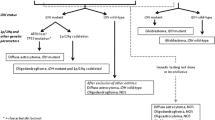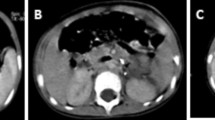Abstract
Leptomeningeal metastases (LMs) are a critical neurological manifestation of solid organ malignancies. Early diagnosis and prompt treatment is necessary to improve outcomes. We classified LM on the basis of cytological or histological and imaging studies. A total of 14 patients of LM from solid organ malignancies diagnosed between July 2016 and December 2018 were included in the series. LM was classified based on cerebrospinal fluid (CSF) cytology and magnetic resonance imaging (MRI) findings. Survival outcomes were noted. LM from carcinoma of breast and lung accounted for most of the cases. Type I LM was seen in 12 patients while 2 accounted for type II LM. Median overall survival (OS) was 40.5 days. Newer-generation tyrosine kinase inhibitor (TKI) therapy seems promising in the treatment of LM. Classification of LM based on cytology/histology and imaging findings allows early diagnosis and treatment. Newer-generation TKIs should be used for the treatment of LM if indicated.
Similar content being viewed by others

References
Eberth CJ (1870) Zur Entwicklung des Epitheliomas (Cholesteatomas) dur Pia under der Lungs. Virchows Arch 49:51–63
Olson ME, Chernik NL, Posner JB (1974) Infiltration of the leptomeninges by systemic cancer. A clinical and pathologic study. Arch Neurol 30:122–137
Clarke JL, Perez HR, Jacks LM, Panageas KS, Deangelis LM (2010) Leptomeningeal metastases in the MRI era. Neurology. 74:1449–1454
Le Rhun E, Weller M, Brandsma D, Van den Bent M, de Azambuja E, Henriksson R et al (2017) EANO-ESMO Clinical Practice Guidelines for diagnosis, treatment and follow-up of patients with leptomeningeal metastasis from solid tumours. Ann Oncol 28(suppl_4):iv84–iv89
Yap HY, Yap BS, Tashima CK, DiStefano A, Blumenschein GR (1978) Meningeal carcinomatosis in breast cancer. Cancer. 42:283–286
Wasserman WR, Glass JP, Posner JB (1982) Diagnosis and treatment of leptomeningeal metastases from solid tumours: experience with 90 patients. Cancer. 49:759–772
Pan Z, Yang G, He H, Yuan T, Wang Y, Li Y et al (2018) Leptomeningeal metastasis from solid tumors: clinical features and its diagnostic implication. Sci Rep 8:10445
Grossman SA, Finkelstein DM, Ruckdeschel JC, Trump DL, Moynihan T, Ettinger DS (1993) Randomized prospective comparison of intravenous methotrexate and thiotepa in patients with previously untreated neoplastic meningitis. Eastern Cooperative Oncology Group. J Clin Oncol 11:561–569
Hitchins RN, Bell DR, Woods RL, Levi JA (1987) A prospective randomized trial of single-agent combination chemotherapy in meningeal carcinomatosis. J Clin Oncol 5:1655–1662
Niwinska A, Rudnicka H, Murawska M (2015) Breast cancer leptomeningeal metastasis: the results of combined treatment and the comparison of methotrexate and liposomal cytarabine as intra-cerebrospinal fluid chemotherapy. Clin Breast Cancer 15:66–72
Meng Z, Zhang Q, Hong K, Han W, Zhao Z, Liu Y, He J, Bu H (2018) Clinical outcome and prognostic analysis of meningeal carcinomatosis treated by intrathecal chemotherapy. Expert Rev Pharmacoecon Outcomes Res 18:455–460
Grimsrud KW, Mrugala MM (2019) Next-generation epidermal growth factor receptor tyrosine kinase inhibitors for leptomeningeal carcinomatosis: review of 2 cases. Neurologist. 24:59–61
Petrelli F, Lazzari C, Ardito R, Borgonovo K, Bulotta A, Conti B et al (2018) Efficacy of ALK inhibitors on NSCLC brain metastases: a systematic review and pooled analysis of 21 studies. PLoS One 13:e0201425
Collier TL, Maresca KP, Normandin MD, Richardson P, McCarthy TJ, Liang SH et al (2017) Brain penetration of the ROS1/ALK inhibitor lorlatinib confirmed by PET. Mol Imaging 16:1536012117736669
Kumar Shah B, Pak I, Budathoki N, Buker K (2017) Targeted therapy for leptomeningeal metastases in non-small cell lung cancer – changing treatment paradigms. Chin J Cancer Res 29:535–542
Author information
Authors and Affiliations
Contributions
DS, LA, and RS were involved in data collection. DS and MW wrote the manuscript. DS, LA, and RS approved the final manuscript.
Corresponding author
Ethics declarations
The study was approved by institutional ethical committee.
Conflict of Interest
The authors declare that they have no conflict of interest.
Additional information
Publisher’s Note
Springer Nature remains neutral with regard to jurisdictional claims in published maps and institutional affiliations.
Rights and permissions
About this article
Cite this article
Deepak, S., Lima, A., Rajat, S. et al. Classification of Leptomeningeal Metastases from Solid Organ Malignancies and Clinical Outcomes: Series from a Cancer Research Centre. Indian J Surg Oncol 11, 308–312 (2020). https://doi.org/10.1007/s13193-020-01071-0
Received:
Accepted:
Published:
Issue Date:
DOI: https://doi.org/10.1007/s13193-020-01071-0



